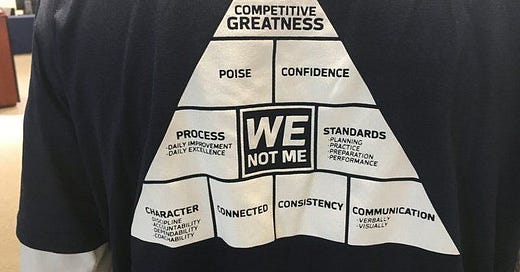Most teams don’t have a performance problem…
They have a 'frame of reference' problem.
Every individual walks into a team with a frame of reference:
→ A personal map of 'high-performance'’
→ What “done well” means.
→ How fast is fast.
→ How honest feels.
→ What’s fair, what’s normal, what’s “good enough.”
These frames are shaped by experience, values, mentors, and even childhood.
We all bring our ME.
The challenge?
We assume our frame is the default.
We assume others see what we see.
We don’t discuss our shared view of the world; we talk about my individual views of the world.
And suddenly, things feel “off”.
Misaligned standards. Friction in decision-making. Confusion that gets labelled as underperformance.
It’s this confusion, this distraction, that has a significant tax on performance.
It’s a 'frame of reference' gap. A mindset gap.
High-performing teams align frames.
They build a collective WE by surfacing the hidden assumptions beneath the surface.
They get intentional about how we see the work, not just what we’re doing.
Take a look at this image:
It’s from the LA Rams’ culture model - a blueprint from head coach Sean McVay. They've called it the Pyramid of Success (based on Jon Woodens work). In other words, it's a frame of reference.
Notice the centre: “WE not ME.”
Not just a slogan. A mindset.
Around that? Clear building blocks. Shared language. Visible expectations.
Poise. Confidence. Standards. Process.
High-performing teams are intentionally designed and lived. And they’re not designed by copying competitors.
It’s why I consistently emphasise the importance of clarity. Trust without clarity, you get happy people lacking focus. When trust and clarity come together, people don't just know what to do; they understand why they're doing it.
👉 Here’s a few question you can ask your team:
1) What does good look like to you?
2) What’s the invisible culture at play here - the stuff we never talk about but everyone feels?
3) What does excellence look like to us - not just as individuals, but together?
4) What does it look and feel like when we challenge each other honestly, with care?
5) In what ways might our concept of ‘WE’ be unclear, inconsistent, or still developing?
I’m supporting a lot of teams around the importance of ‘productive disagreement’. Please get in touch if you’d like to find out more. And hit reply if you’d like a copy of my productive disagreement playbook.
Have a great weekend.
Dean




As a coach, this resonates incredibly. Without clarity, things can go off the rails quickly. It's an easy enough concept to understand, but can be so tricky to implement. Everyone comes with their own perspective/history/story and as a team we need to create our collective story. Like an orchestra...everyone does their part, as the larger group plays the same tune. Total alignment. Simple but not easy!! Thanks for this post.